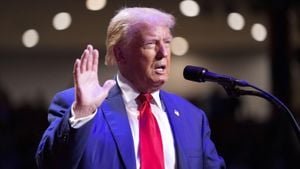The 2024 elections have come with their own share of security concerns, as officials across the United States work to address challenges presented by misinformation, technical issues, and controversial claims about potential voter fraud.
On November 5, Election Day, the U.S. Cybersecurity and Infrastructure Security Agency (CISA) reported only minor disruptions, asserting there was no sign of malicious activities affecting the election's security. CISA Director Jen Easterly emphasized this point to the press, declaring, "While disruptive, this was a threat the election officials prepared for and effectively mitigated working closely with law enforcement partners." With hoax bomb threats impacting polling places across several states, CISA highlighted its collaboration with officials to maintain safety and order. Despite the chaotic environment, the integrity of the voting process remained intact according to security experts.
The repercussions of misinformation were palpable during this election. Concerns about disinformation campaigns, both from domestic and foreign entities, surfaced throughout the process. Officials across the nation urged voters to be mindful of false narratives aimed at undermining their confidence and trust in the electoral system. Easterly reiterated the importance of vigilance against foreign interference, asserting, "We must remain alert for attempts to use false narratives and disinformation to erode American confidence and integrity around elections."
Meanwhile, election workers faced increases in voter turnout alongside reports of technical issues at polling places. Some states, such as Georgia, reported record turnout, but not without complications. Voting hours were extended at various locations due to delays caused by malfunctioning equipment. For example, voters waiting at polling locations could encounter lines exceeding three hours – a situation exacerbated by broken machines and lengthy updates on vote counting.
Incidents like these were documented early on Election Day when voters at Lehigh University’s precinct faced hours of waiting thanks to broken voting machines. Election officials like Pennsylvania Secretary of State Al Schmidt were ready to address such challenges, emphasizing the notion of remaining vigilant against misinformation to support voter turnout.
Attention also turned to the state of Wisconsin, where election supervisors decided to retabulate absentee ballots after human error led to mishandling at the Milwaukee voting site. Wisconsin Election Commission Administrator Meagan Wolfe affirmed the need for this measure to stave off any future claims of irregularities. Wolfe noted, "Milwaukee made the decision to make sure this was addressed today so no one could use it to call those legitimate votes called to question later." This shows the persistent commitment from officials to uphold transparency.
Cut to Pennsylvania, where the stakes for candidate performance are high. Amid election debates, Trump made less-than-subtle statements about alleged electoral cheating he claimed to foresee. Facts, as reported by Philadelphia city commissioner Seth Bluestein, firmly denied such rumors, asserting there was no credible evidence to support claims of cheating; the voting procedures held sound integrity throughout.
Bouncing back to other notable incidents, officials extended voting hours to accommodate delays, ensuring every voice counted, especially amid skepticism over ballot counting processes. Officials expressed confidence, with Georgia's Secretary of State declaring, "At the end of the day, it's going to be fair and fast and accurate." This attestation allows voters to breathe easier, knowing efforts made were devoted to fair practices.
While these security updates provide some comfort, many voters continue to feel unsettled due to the narrative peddled by Trump and his supporters, casting shadows of uncertainty. The former president has positioned himself as combating what he labeled as "an evil Democrat system" throughout his campaign. This framing has seeped deep, leading to his suggestion of stonewalling to amplify dissatisfaction surrounding mail-in voting processes — regardless of the official security confirmations asserting everything is under control.
With election officials actively pushing back against similar disinformation, they remind the public of the importance of transparency and trust — qualities they strive to maintain during controversies aiming to jeopardize voter confidence. Schneider, along with various threatened districts, emphasized they would be available to refute any challenges to valid votes through reliable channels and factual updates.
This election is marked not only by traditional issues of voter turnout and ballot counting but also wading through layers of false assertions and claims to complicate the voting processes. The battle remains as America wades through its complex electoral framework, hoping to diminish divisive rhetoric along the pathway. The coordination of state and federal officials indicates they are prepared and remain steadfast against future threats, continuing to send hopeful signals as America hunkers down to vote.
Officials prepare for looming expectations and uncertainty during what many regard as pivotal moments, aiming for clearer paths illuminated by facts and cooperative governance.
With all the elements coming together, the race for the White House not only fuels political debates but also sets the stage for intense scrutiny surrounding election security, performance, and factual preservation, ensuring the return of fundamental democratic values primed with accuracy. The election storm gathers momentum as officials gear up to tackle what lies on the horizon, emphasizing their chains of command to engage voters, protect ballots, and deliver the timely justice both candidates and voters want to witness.
Let’s see what this historic crossroads reveals for the future of American democracy and the foundations it secured long ago.



